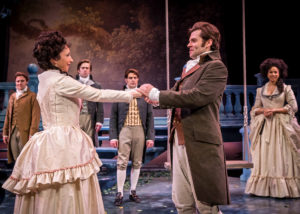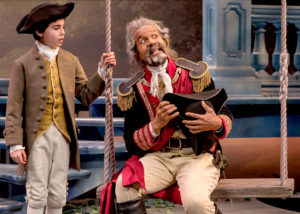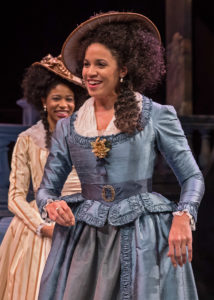
 Recommended *** “This is not so well as I looked for, but the best that ever I heard.” This line, spoken by the clever Berowne (Nate Burger), is said in reference to the loquacious Don Adriano de Armado (Allen Gilmore) and the assurances of his friends that the Spanish lord’s vain babbling would prove sufficient entertainment for an extended stay in a scholarly cloister. But it also summarizes the production of Love’s Labo(u)r’s Lost, now at Chicago Shakespeare Theater, in large part because the play contains so many characters like Don Armado. Love’s Labor’s Lost contains all the things people love about Shakespeare’s comedies: witty banter, attractive couples in gorgeous period costumes, a silly plot involving disguises and mishandled letters, and an unexpected turn toward the serious. But having probably been written in the mid-1590s, right when Shakespeare was coming into his maturity as an artist, this play also contains an excessive amount of the wordplay and instantly-dated references that people most dislike about Shakespeare’s comic sensibility. Difficult though staging it is, director Marti Maraden has assembled a cast of eighteen persons who maximize the play’s charms, making it enjoyable overall and a showcase of the ensemble’s mastery of this comedic style.
Recommended *** “This is not so well as I looked for, but the best that ever I heard.” This line, spoken by the clever Berowne (Nate Burger), is said in reference to the loquacious Don Adriano de Armado (Allen Gilmore) and the assurances of his friends that the Spanish lord’s vain babbling would prove sufficient entertainment for an extended stay in a scholarly cloister. But it also summarizes the production of Love’s Labo(u)r’s Lost, now at Chicago Shakespeare Theater, in large part because the play contains so many characters like Don Armado. Love’s Labor’s Lost contains all the things people love about Shakespeare’s comedies: witty banter, attractive couples in gorgeous period costumes, a silly plot involving disguises and mishandled letters, and an unexpected turn toward the serious. But having probably been written in the mid-1590s, right when Shakespeare was coming into his maturity as an artist, this play also contains an excessive amount of the wordplay and instantly-dated references that people most dislike about Shakespeare’s comic sensibility. Difficult though staging it is, director Marti Maraden has assembled a cast of eighteen persons who maximize the play’s charms, making it enjoyable overall and a showcase of the ensemble’s mastery of this comedic style.
Ferdinand (John Tufts), the young king of Navarre, has decreed that his court will be closed to women for three years so that he and his friends may pursue scholarship that will win them eternal fame. Two noblemen near his age, Dumaine (Julian Hester) and Longeville (Madison Niederhauser), eagerly join him, but Berowne expresses skepticism about the purpose of this endeavor and whether the king’s harsh asceticism is really necessary. Longeville has written a law that any woman approaching the court shall have her tongue cut out, though it is clear from Longeville’s explanation that he never seriously imagined this penalty would need to be enforced. After arguing against his friends for a while, Berowne suddenly gives in, perhaps feeling peer pressured, or perhaps hoping to undermine the court from within. Immediately after taking his oath, he reminds the king that the princess of France (Jennie Greenberry) is due to arrive with three ladies-in-waiting to negotiate on behalf of her sickly father. The king had completely forgotten that and hopes the princess won’t mind pitching camp in the palace grounds. He doesn’t think she will, anyway.
The French ladies, each of whom have a crush on one of the Navarrese nobles, are rather displeased to discover how boyish their counterparts actually are. (Other than the princess, the French noblewomen are played by Jennifer Latimore, Laura Rook, and Taylor Blim.) The men, however, are instantly smitten, and each separately plots to break his oath. Meanwhile, Don Armado and a commoner, Costard (Alex Goodrich), are vying for the hand of the much more available maid, Jaquenetta (Maggie Portman), the young men’s teachers, Holofernes (David Lively) and Sir Nathaniel (Greg Vinkler), the princess’s aide, Boyet (James Newcomb), and Don Armado’s boy-servant, Moth (Aaron Lamm) heap scorn and sarcasm on everyone, and a constable, Anthony Dull (Steven Pringle), doesn’t understand a word of what’s going on.
At the performance I attended, it took about ninety minutes for the audience to really get into the play. All things considered, that’s not so bad. Maraden actually did cut some lines, and a lot of the humor does come from the text, instead of business imposed onto it. The story is never difficult to follow, and though not incredibly complex, the characters are engaging and even endearing in their friendships, if not their approaches to the opposite sex. Much of their rhetoric is written to highlight follies or limitations in their way of thinking. The Navarrese are earnest, but fickle, and they lack the life experience that would contextualize the wisdom they are attempting to study and the judgement they need to communicate effectively. (In one of the plays’ first lines, for example, King Ferdinand defensibly, but confusingly, uses “cormorant” as an adjective.) Berowne is also somewhat mean-spirited in how he applies his wits, though he is not nearly as conceited as Holofernes and Sir Nathaniel. Don Armado’s verbal flourishes can at least be justified by his not being a native speaker of the language, while Moth and Costard, though uneducated, are highly intelligent. But as much as the actors’ physicality and interactions help to demonstrate these traits, the audience still has to pay very close attention to the frequent, lengthy speeches to get the full effect, and we’re still ultimately watching over half a dozen kind of annoying people who are in love with their own voices.
The designers have set the play in the late eighteenth century, the Age of Enlightenment, allowing costume designer Christina Poddubiuk and wig and make-up designer Richard Jarvie to fully utilize the elegant fashions of that era. Composer Keith Thomas’s original music for the spring and winter song is ideal for the play’s final moment and works perfectly in tandem with Greg Hofmann’s lighting. Kevin Depinet has implicitly located the action in the kind of artificially landscaped estate that symbolizes both the attempts at that time to “perfect” the natural world by imposing geometric patterns onto it, as well as the enclosures of peasants’ communal land in the service of industrial farming. This, too, is consistent with the characterization of the king and his friends as well-intentioned and to some degree sympathetic, but arrogant and unaware of how they affect others.
If scholars are correct, Love’s Labor’s Lost was written around the same time as Romeo and Juliet, which Chicago Shakespeare will be performing for high schools later this season as part of their Short Shakespeare program. I doubt we’ll be seeing a Short Shakespeare Love’s Labor’s Lost anytime soon; the play is not one of Shakespeare’s more accessible ones and is likely to be really appreciated only by people who are already familiar with him. However, it does complement Shakespeare’s other works quite well. Besides the thematic contrast with Romeo and Juliet in its ending, Love’s Labor’s Lost also contains plot elements that are repeated in Measure for Measure with a much darker tone and romantic relationships similar to that of Benedict and Beatrice in Much Ado About Nothing without providing the quarreling lovers with a common external problem. The intriguing connections between the texts are further complicated by how many of the actors in the large cast are returning to CST’s stage from previous roles. Love’s Labor’s Lost is difficult, but this production provides a great deal for Shakespeare lovers to chew over.
 Love’s Labor’s Lost will play at Chicago Shakespeare Theater on Navy pier at 800 E Grand Ave through March 26. Tickets are $48-88, with discounts for groups and people under 35. To order, visit ChicagoShakes.com or call 312-595-5600. Discounted parking at Navy Pier is available to Chicago Shakespeare patrons.
Love’s Labor’s Lost will play at Chicago Shakespeare Theater on Navy pier at 800 E Grand Ave through March 26. Tickets are $48-88, with discounts for groups and people under 35. To order, visit ChicagoShakes.com or call 312-595-5600. Discounted parking at Navy Pier is available to Chicago Shakespeare patrons.
Run time is two hours and thirty minutes with one intermission.
To see what others are saying, go to TheatreinChicago.com and click “Love’s Labor’s Lost.”






More Stories
” A Lie of The Mind”
“Titus Andronicus”
“Joseph and the Amazing Technicolor Dreamcoat”